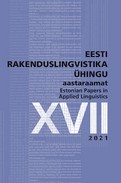ŽANRIÕPETUS KUI AINEKIRJAOSKUSE TUGI: ESIMENE KATSEUURING
GENRE PEDAGOGY TO PROMOTE DISCIPLINARY LITERACY: PILOT INTERVENTION
Author(s): Merilin AruveeSubject(s): Finno-Ugrian studies, School education, Pedagogy
Published by: Eesti Rakenduslingvistika Ühing (ERÜ)
Keywords: literacy; integrated teaching; texts; describing; writing instruction; mother tongue instruction; systemic functional linguistics; educational design research;
Summary/Abstract: Disciplinary literacy (DL) as subject-specific reading and writing (Moje 2008) is one way to develop content area knowledge, literacy skills and raise language awareness in an integrated way. DL sets texts as disciplinary social acts in focus and shares therefore common ground with SFL rooted genre pedagogy, which combines learning and language and is increasingly taking place as a DL practise. This study attempts to apply genre pedagogy as a suitable methodical framework to develop DL in the Estonian context. The aim of this first pilot cycle of the design based study is to gain knowledge on how genre pedagogy could support disciplinary literacy. Based on the outcomes, the design of intervention, materials and methods are improved to carry out future cycles. The pilot study was implemented in one Estonian K-14 school, as a part of a whole school history project. Genre pedagogy-based activities were implemented in L1 Estonian classrooms where students learned how to write a description of church. The participants were two teachers of L1 Estonian and their 82 students. Lessons were recorded, follow-up interviews with teachers were carried out, students’ descriptions, pre- and post-tests were analysed. The results show that text-centered disciplinary teaching is complex and distant for both teachers and students, but makes the learning process visible and supports deep learning. Descriptive text as a pre-genre needs more scaffolding due to the unfamiliar process of text-analysis and deconstruction. The article poses a R2L based framework for the next intervention cycle.
Journal: Eesti Rakenduslingvistika Ühingu aastaraamat
- Issue Year: 2021
- Issue No: 17
- Page Range: 5-27
- Page Count: 23
- Language: Estonian

